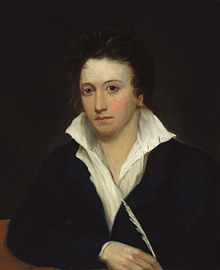
Back Percy Bysshe Shelley Afrikaans Percy Bysshe Shelley AN بيرسي بيش شيلي Arabic بيرسى بيش شيلى ARZ Percy Bysshe Shelley AST Persi Biş Şelli Azerbaijani پرسی بیش شلی AZB Персі Біш Шэлі Byelorussian Пэрсі Біш Шэлі BE-X-OLD Пърси Биш Шели Bulgarian
Percy Bysshe Shelley | |
|---|---|
 Portrait by Alfred Clint, 1819 | |
| Born | 4 August 1792 Field Place, Warnham, West Sussex, England |
| Died | 8 July 1822 (aged 29) Gulf of La Spezia, Kingdom of Sardinia |
| Occupation |
|
| Alma mater | University College, Oxford |
| Literary movement | Romanticism |
| Spouse |
|
| Children | 6, including Sir Percy, 3rd Baronet |
| Parents | Timothy Shelley (father) |
| Signature | |
Percy Bysshe Shelley (/bɪʃ/ ⓘ BISH;[1][2] 4 August 1792 – 8 July 1822) was a British writer who is considered as one of the major English Romantic poets.[3][4] A radical in his poetry as well as in his political and social views, Shelley did not achieve fame during his lifetime, but recognition of his achievements in poetry grew steadily following his death, and he became an important influence on subsequent generations of poets, including Robert Browning, Algernon Charles Swinburne, Thomas Hardy, and W. B. Yeats.[5] American literary critic Harold Bloom describes him as "a superb craftsman, a lyric poet without rival, and surely one of the most advanced sceptical intellects ever to write a poem."
Shelley's reputation fluctuated during the 20th century, but in recent decades he has achieved increasing critical acclaim for the sweeping momentum of his poetic imagery, his mastery of genres and verse forms, and the complex interplay of sceptical, idealist, and materialist ideas in his work.[6][7] Among his best-known works are "Ozymandias" (1818), "Ode to the West Wind" (1819), "To a Skylark" (1820), "Adonais" (1821), the philosophical essay "The Necessity of Atheism" (1811), which his friend T. J. Hogg may have co-authored, and the political ballad "The Mask of Anarchy" (1819). His other major works include the verse dramas The Cenci (1819), Prometheus Unbound (1820) and Hellas (1822), and the long narrative poems Alastor, or The Spirit of Solitude (1815), Julian and Maddalo (1819), Adonais (1821), and The Triumph of Life (1822).
Shelley also wrote prose fiction and a quantity of essays on political, social, and philosophical issues. Much of this poetry and prose was not published in his lifetime, or only published in expurgated form, due to the risk of prosecution for political and religious libel.[8] From the 1820s, his poems and political and ethical writings became popular in Owenist, Chartist, and radical political circles,[9] and later drew admirers as diverse as Karl Marx, Mahatma Gandhi, and George Bernard Shaw.[9][10][11]
Shelley's life was marked by family crises, ill health, and a backlash against his atheism, political views, and defiance of social conventions. He went into permanent self-exile in Italy in 1818 and over the next four years produced what Zachary Leader and Michael O'Neill call "some of the finest poetry of the Romantic period".[12] His second wife, Mary Shelley, was the author of Frankenstein. He died in a boating accident in 1822 at age 29.
- ^ "Shelley". Collins English Dictionary. HarperCollins. Retrieved 7 June 2019.
- ^ "Shelley". Merriam-Webster.com Dictionary. Retrieved 7 June 2019.
- ^ Cite error: The named reference
:6was invoked but never defined (see the help page). - ^ "Shelley, Percy Bysshe (1792–1822), poet". Oxford Dictionary of National Biography (online ed.). Oxford University Press. 2004. doi:10.1093/ref:odnb/25312. ISBN 978-0-19-861412-8. Retrieved 8 February 2021. (Subscription or UK public library membership required.)
- ^ Cite error: The named reference
Bloom410was invoked but never defined (see the help page). - ^ Leader, Zachary; O'Neill, Michael, eds. (2003). Percy Bysshe Shelley, The Major Works. Oxfordshire, England: Oxford University Press. pp. xi–xix. ISBN 0-19-281374-9.
- ^ Cite error: The named reference
:9was invoked but never defined (see the help page). - ^ Holmes, Richard (1974). Shelley, the Pursuit. London, England: Weidenfeld and Nicolson. pp. 391, 594, 678. ISBN 0297767224.
- ^ a b Cite error: The named reference
:10was invoked but never defined (see the help page). - ^ Weber, Thomas (2004). Gandhi as Disciple and Mentor. Cambridge, England: Cambridge University Press. pp. 26–30. ISBN 0-521-84230-1.
- ^ Cite error: The named reference
:3was invoked but never defined (see the help page). - ^ Leader and O'Neill (2003), p. xiv.
© MMXXIII Rich X Search. We shall prevail. All rights reserved. Rich X Search